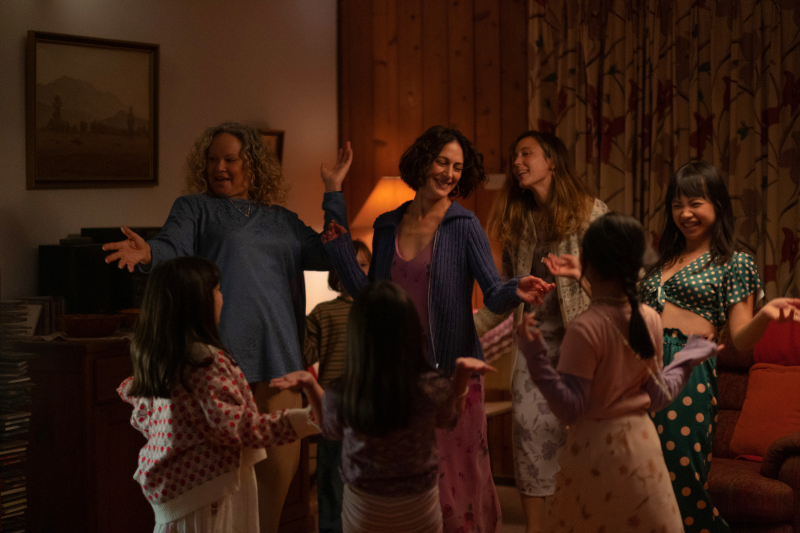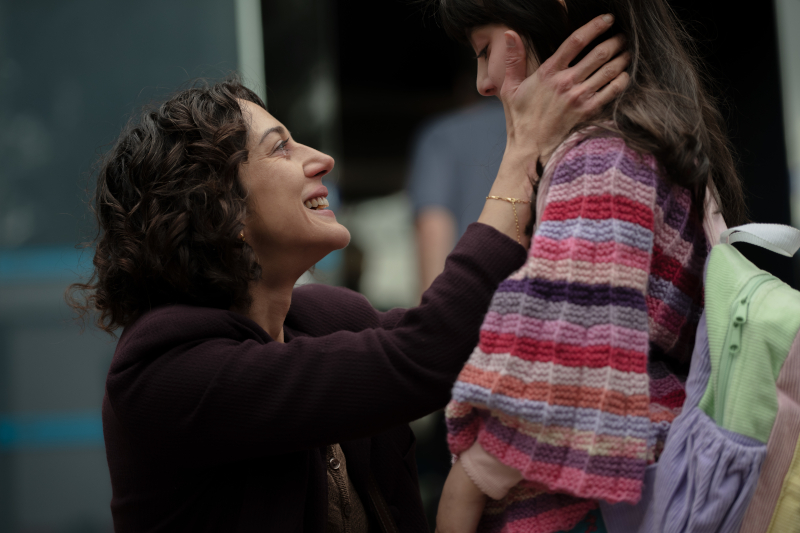Director – Noora Niasari – 2023 – Australia – Cert. 15 – 117m
*****
An Iranian mother and her young daughter, holed up in a women’s refuge in Australia, live in fear of the girl’s estranged father who wants to take them both back to Iran – out in UK cinemas on Friday, August 2nd
A woman is with a mum and her little girl in a shopping mall. The woman tells the little girl to remember the counters, because if daddy brings her here, she must find them and tell the security man nearby who she is. The girl’s mother reminds her that daddy said he’d take her on a plane. The woman tells the mother, she’s done the right thing.
Shayda (Zar Amir Ebrahimi from Holy Spider, Ali Abassi, 2022) and her young daughter Mona (Selina Zahednia) are separated from Shayda’s husband. The other woman is Joyce (Leah Purcell), who runs a woman’s refuge house catering for residents from a variety of ethnic groups. Shayda and Mona, for example, are Iranian. Shayda’s photo album tells the story of her life. In the mid-1980s, she graduated and got married in Iran; in the early 1990s, the couple moved to Brisbane, Australia. Husband Hossain, however, became increasingly controlling and on one occasion tried to rape Shayda. This history emerges verbally when Joyce is helping Shayda record a verbal testimony of what happened between her and her husband, a process during which they have to fire a supposedly impartial translator because she knows Shayda and replace her with another translator.

While Shayda is seeking sole custody of Mona, the courts unexpectedly grant visiting rights to Hossain in the interim, who can pick up his daughter at the local mall, to spend certain afternoons with her, a situation that’s far from ideal but, as Joyce points out, one with which Shayda needs to fully co-operate if she is to ultimately get full custody. When she meets Hossain (Osamah Sami) to hand over the girl for the afternoon, the tension is so palpable that you could cut the air with a knife. In one of Hossain’s afternoons with the girl, where he’s promised to take her to see The Lion King, Hossain instead drags the daughter along as her spies on the mother as she shops for clothes. When he finds his daughter wearing a necklace, he wants to know where it came from, suspecting that his wife may have another man in his life (even though it really isn’t any of his business).
Sometimes it seems as if Islamic / Iranian culture is against Shayda. Her mum phones her from Iran, repeatedly asking if there’s a chance Shayda and her ex could get back together.
Her friend Elly (Rina Mousavi), also now living in Brisbane, is more sympathetic; through her, Shayda meets Elly’s nephew Farhad (Mojean Aria), to whom she finds herself attracted with the possibility of romance in the air. Farhad knows nothing of Shayda’s situation. Shayda rarely leaves the women’s refuge – she’s terrified of being recognised by people she knows from her old life.
Against her better judgement, Shayda is persuaded to go to Elly’s party for Nowruz (Persian New Year). At the party, One of Elly’s less liberal Iranian guests is horrified that Shayda is there and makes a scene, and Shadyda is about to leave with Mona when Farhad turns up. She decides to stay after all, and the two wander in Elly’s garden, with him reciting Islamic poetry to her in the moonlight. Somehow, though, Hossain has got wind of the party, turns up, and sees the two of them together, which drives him into a rage. He beats Farhad up until dragged away from the young man by a couple of the other guests. Joyce still has to drive Shayda and Mona away, with the enraged Hossain running after the car, even though it swiftly outpaces him.

While Shayda’s story, based on a real life woman seen briefly in the end credits, provides the central thread of the narrative, we also glimpse in passing something of the lives of the other women in the shelter. One woman and her teenage daughter, who has a baby, likes to party and is not above asking Shayda to babysit for her even though both mother and daughter seem to disdain her Iranian background. Another woman, from the UK, is hoping to be reunited with her young son, who she’s not seen since his father took the boy away from her. One of the woman is stalked by people who park their cars outside the house and hang around, seemingly doing nothing, causing the woman to experience great stress.
The film is, however, mostly carried by a terrific performance by Ebrahimi as Shayda, alternately full of the joys of life and Iranian culture and recoiling from the presence of her creepy husband. Zahednia too impresses as her little girl, torn between mummy and daddy but not quite able to see through her dad’s superficial charm to the devious manipulation beneath in quite the way that her mum can. We spend much of our time in the company of this mother and daughter, And although Shayda’s situation clearly is not an ideal one, she is a woman determined to make the best of things and work through the situation to the better life that she hopes lies beyond. We watch as she spends time with her daughter, teaching her to exercise or to dance, and generally being a good mother to her.
Although a drama shot on quite a small budget, the film also boasts striking camerawork shot by Sherwin Akbarzadeh with a terrific eye and a strong sense of both colour and composition. Although set in a refuge, the piece has a strong feeling for Islamic / Iranian culture – the food, the music, the dancing, all of which serve to draw the audience in. The narrative overall has a feeling of reality about it, with Ebrahimi an invaluable and thoroughly watchable asset. And there’s a down to Earth. Australian rawness about the whole thing. A terrific little film which holds the attention throughout.
The film was executive produced by Cate Blanchett.
Shayda is out in cinemas in the UK on Friday, August 2nd.
Read my shorter review for Reform magazine.
Trailer:
